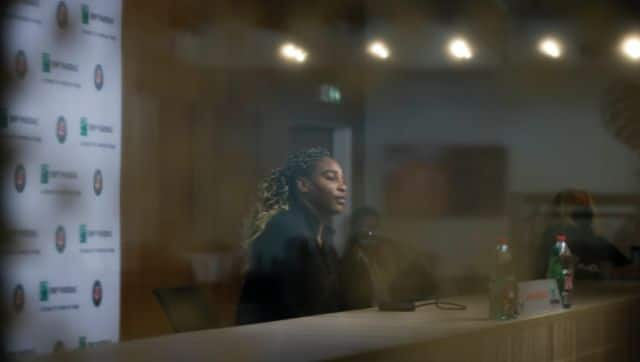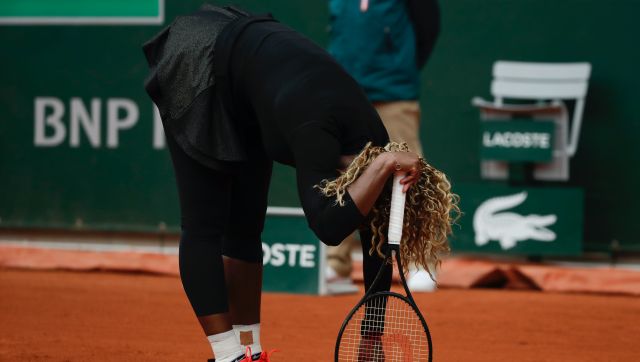By her own lofty standards and ambitions, Serena Williams’ three titles at Roland Garros are her weakest show in Majors. She’s entered the main draw 16 times, winning the title in 2002, 2013 and 2015. In comparison, she’s won the Australian Open seven times, Wimbledon seven times and US Open six times. Anyone else and this record would be bonkers, but this is no regular player, we’re talking about the G.O.A.T. ( Even if she may not consider herself to be one). The French Open has been her biggest test at a Grand Slam where the red dirt slows down her big, booming groundstrokes and the ability to quickly change the course of the rally is not the easiest as players slide around. It is where she began her 33 match winning streak at Majors in 2002-03 and formed part of 34 and 33 match-winning streaks in 2013 and 2014-15 respectively. But it is also where she suffered her only first-round exit at a Slam (to Virginie Razzano in 2012). Now as she came in, at 39, with hopes of ending her quest for No 24, another foe has resulted in her quick and sudden exit: an injury. She pulled out of the tournament ahead of her second round, against Tsvetana Pironkova, with a left Achilles’ tendon injury. The decision didn’t surprise many. She had admitted she wasn’t a 100% having picked up the injury during her loss at US Open. It forced her to skip the Italian Open to recover. “After New York, I flew to France and I’ve just been training at (coach Patrick Mouratoglou’s) academy, mostly rehabbing, trying to be ready,” she said ahead of the French Open. “I wouldn’t be playing if I didn’t think I could perform,” she added. “I’m not at 100 percent physically. But I don’t know any athlete that ever plays physically when they’re feeling perfect. That’s just something I think as athletes we have to play with.” In the first round, she looked sluggish and slower than her usual self. The movement and shots looked laboured. The scoreline (7-6, 6-0) may not suggest that though. Williams trained 4-2 in the first set before staging a comeback.
On Wednesday she said she needed “four to six weeks of sitting and doing nothing” followed by “It’s more than likely that I won’t play another tournament this year.” Given she pulled out before the match even got underway, it would be safe to assume that’s curtains for her 2020 season. In a tough year for everyone, Williams closed it out with a 16-5 win-loss record. Never has her win-loss record in a year been worse since 1997 when she played just five Tour-level matches. She knew her chances of success in Paris were slim, not the go-to favourite for a Grand Slam any more, and yet she stuck around. Despite owning a home in the French capital, she was required to stay in the tournament approved hotel to reduce risk from the coronavirus. “It’s definitely weird. This has always been my home away from home. I always loved being here. It has been really different for me staying at an apartment,” said Williams. “It was really important to do everything that I could to just create my own personal bubble, just to stay in it, a travel bubble, like everything that I can possibly do we kind of do. It works. It definitely beats staying at home.” To recap: Williams battled an injury and virus concerns to go for a Grand Slam title once again. At 39. Despite owning a record 23 Slams in the Open Era. That’s a telling statement of her resilience. [caption id=“attachment_8869641” align=“alignnone” width=“640”]  Serena Williams pulled out of French Open before taking court in her second-round match. AP[/caption] “I really wanted to give an effort here,” Williams said, on Wednesday, before adding: “But just looking long-term in this tournament, will I be able to get through enough matches? For me, I don’t think I could. I was struggling to walk. That’s kind of a telltale sign that I should try to recover.” It has now been over three years since she last won a Grand Slam, would become four when she takes court at 2021 Australian Open. She’s never gone this long without a Major title. The Achilles injury, she feels, was “bad timing and bad luck”. The longevity of her career is helped by the success. And the success has been consistent as she kept going. As she kept picking herself up, going after yet another tournament and milestone. “It gets harder to win as we all age,” said golfer Tiger Woods before the US Open where he failed to make the cut . He added: “I think that whether it’s Rafa [Rafael Nadal] or Fed [Roger Federer] or Serena, they’ve been so consistent and so dominante for such a long period of time, that’s how you can have those all-time marks. Consistency over a long period of time is the hallmark of those records.”
Another day at the office for Nadal.
— Roland-Garros (@rolandgarros) September 30, 2020
Hear his thoughts on the underarm serve, and his well wishes for Serena.#RolandGarros pic.twitter.com/gAPMiCwyQE
Nadal, another of the bruised-but-get-going kinds explained the mindset, after reaching the third round. “You really believe that maybe you win that match, then you can improve a little bit for the next couple of matches with the doctor or the staff after that victory, then it is normal that you are not showing anything to the world. Then if you can’t keep going, that is the moment to go and say: ‘You know, guys, I can’t anymore. That’s it.’" For Serena, that moment at the French Open came on Wednesday. But it isn’t happening for 2021. “I love playing tennis, obviously,” Williams said. “I love competing. And I’m so close to some things, so I feel like I’m almost there. I think that’s what keeps me going.”


)

)
)
)
)
)
)
)
)



